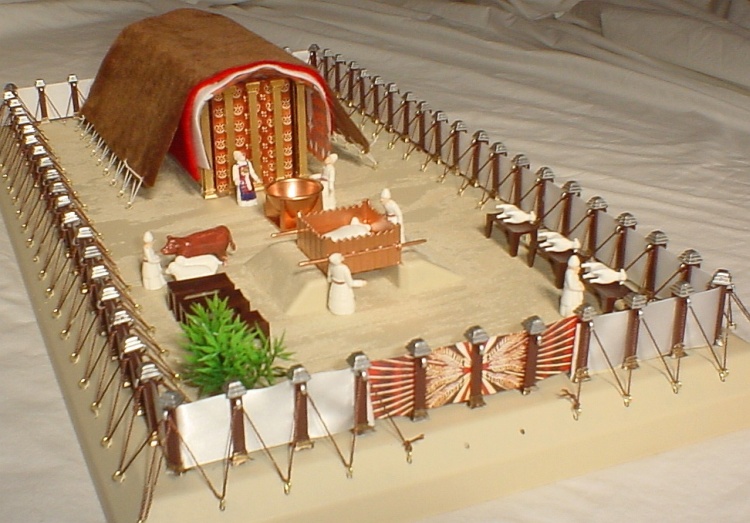
tabernacle
n. 1. any place or house of worship, esp. one designed for a large congregation; 2. (often initial capital letter) the portable sanctuary in use by the Israelites from the time of their wandering in the wilderness after the Exodus from Egypt to the building of the Temple in Jerusalem by Solomon. Ex. 25–27; 3. Ecclesiastical: an ornamental receptacle for the reserved Eucharist, now generally found on the altar; 4. a canopied niche or recess, as for an image or icon; 5. a temporary dwelling or shelter, as a tent or hut. 6. a dwelling place; 7. the human body as the temporary abode of the soul; 8. Nautical: A boxlike support in which the heel of a mast is stepped.
[Origin: 1200–50; ME < LL tabernāculum, L: tent, equiv. to tabern ( a ) hut, stall, inn ( cf. tavern ) + -āculum, prob. extracted from hibernāculum winter quarters ( see hibernaculum)]
Growing up, the only use of tabernacle I ever heard was the Mormon Tabernacle Choir. It never occurred to me that in that context Tabernacle was a synonym for temple ("any place or house of worship, esp. one designed for a large congregation"). Vaguely, I had heard of the Mormon Temple in Salt Lake City. I don't recall anyone ever referring to it as the Mormon Tabernacle.
I also was unaware that the word tavern ("a place where liquors are sold to be consumed on the premises; a bar") is related to tabernacle, in that both are, in different ways, inns.
While tabernacle has sprouted a number of offspring meanings, they all have their genesis (pardon the pun) in Exodus 25, where it appears when God is having a chat with Moses, instructing him on his duties of a prophet.
God talking: "And let them make me a sanctuary; that I may dwell among them. According to all that I shew thee, after the pattern of the tabernacle, and the pattern of all the instruments thereof, even so shall ye make it."
Because it sounds so much like the vulgar term for feces, the wood from which God wanted Moses to make both the tabernacle and the ark of the covenant ("the chest containing the Ten Commandments written on stone tablets, carried by the Hebrews during their desert wanderings") sounds funny: It's called shittim [SHIT-im] and it comes from the shittah [SHIT-uh] tree, a type of acacia.
God: "And they shall make an ark of shittim wood: two cubits and a half shall be the length thereof, and a cubit and a half the breadth thereof, and a cubit and a half the height thereof."
A cubit ("an ancient unit of linear measure, originally equal to the length of the forearm from the tip of the middle finger to the elbow, or about 17 to 22 inches") was the standard measure of its day. Using the forearm sounds like an odd standard, unless you compare it to what we use, a foot.
Getting back to tabernacle, it turns out there is an annual Jewish holiday called the Feast of Tabernacles. Growing up, as a Jew, I don't remember this name. However, reading about it, I realize that's because we called it Sukkahs (pronounced SOOK-us, rhymes with LOOK-us, and meaning "booths"). In Hebrew, the holiday should be called Sukkoth (SUE-coat), which is translated Feast of Booths or Feast Tabernacles. It comes less than a week after Yom Kippur ("the day of atonement") in the autumn. My clearest memory of Sukkahs was being forced to build small huts out of twigs and leaves and junk like that. While Sukkas (or Feast of Tabernacles) is a remembrance of the story of Exodus, it is also a celebration of the fall harvest, and involves eating fresh foods that are harvested at that time of year. I have heard that Sukkahs was the inspiration for the Pilgrims' original Thanksgiving.
Pop culture reference: "On the new hit reality series, Evangelical Survivor, host Jeff Ross divided the cast into two teams, the Gentiles and the Goyim, and instructed each to build a tabernacle based on the design described in the Book of Exodus. Guest judge Edwin Moses deemed the Gentiles' tabernacle, which would serve as their home for the next 39 days, more Godly. Celebrating their win, the Gentiles feasted on a pig. Unfortunately, swine is trayf (Lev. 11:7), so they were all struck dead."


No comments:
Post a Comment